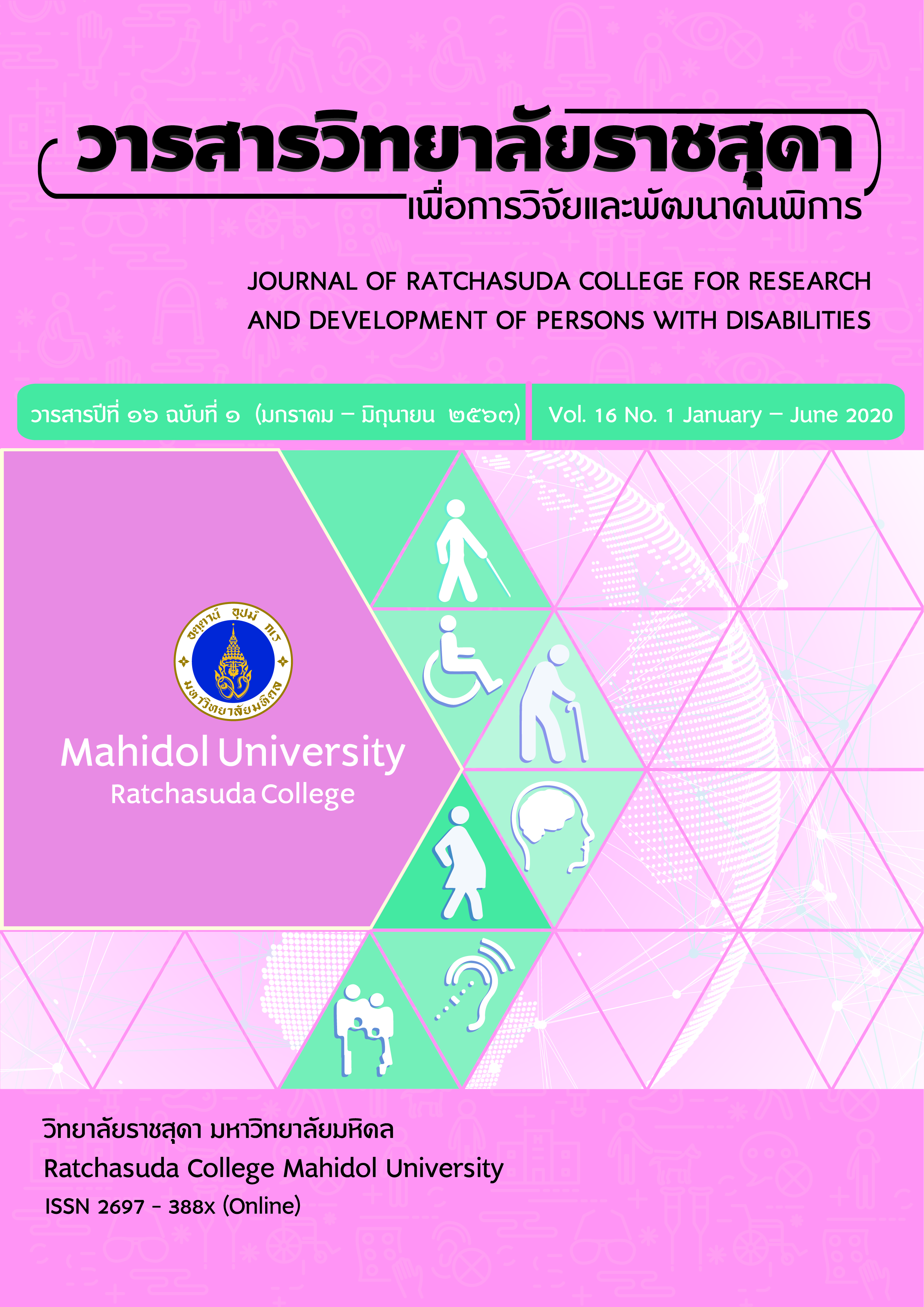The study of state and problems in educational provision for students with learning special needs in vocational trainings for career
Keywords:
Special needs, Vocational training, Students with learning special needsAbstract
The objectives of this research were to study the current status, problems and needs for learning provision of students with learning special needs in vocational trainings for career. The study comprised of two phases. Phase 1: Focus group meeting was conducted using structured interview protocols. There were three focus groups including polytechnic college directors, teachers from polytechnic colleges and parents of students with special learning needs. Phase 2: A pilot of short course training was implemented at polytechnic colleges. Students with learning special needs and their parents were invited to participate in this study. Observation forms of teachers and students were used to collect data. Results found that the short course training were flexible and various while these courses focus only on some vocational skills. Most teachers were experts in vocational skills. However, they needed more training in instructional skills for teaching students with special needs and more encouragement to have positive attitudes towards this group of students. There was a policy to enroll students with learning special needs to various vocational training programs; but most colleges had not provided an Individualized Education Program (IEP). The colleges were lacking of active collaboration among relevant organizations. The study also found that students with learning special needs and parents preferred to be included in vocational programs. However, many of them were worried about the adaptation to learning environment. They preferred to be in a vocational training course that prepared them for future careers, however, they would need an IEP.
Downloads
References
Apornratana, I. (2011). A study on problems and needs of people with mental retardation on vocation training (Master’s Thesis). Bangkok: Srinakharinwirot University.
Arthur-Kelly, M., Lyons, G., & Butterfield, (2006). Classroom management: Creating positive learning environments (3rd. ed). South Melbourne: Thomson.
Autism parent assembly. (2013, September). Operating the strategic of life quality development for disabled people. In administrator of department of empowerment of persons with disabilities (chair), Workshop on issue operating the strategic of life quality development for disabled people to act, Bangkok.
Glover, S. (2019). College and career transition: A bridge to postsecondary success for high school special needs students (Doctoral dissertation, California State University, Long Beach).
Harvey, M. W., Cotton, S. E., & Koch, K. R. (2007). Indiana Secondary CTE Instructors' perceptions of program expectations, modifications, accommodations, and postsecondary outcomes for students with disabilities. Journal for Vocational Special Needs Education, 29(2), 16-32.
Harvey, M. W., & Pellock, C. (2003). Influences of student educational labels, behaviors and learning characteristics as perceived by Pennsylvania secondary career and technical educators: A case study approach. The journal for Vocational Special Needs Education, 25, 30-41.
Hendricks, D. (2010). Employment and adults with autism spectrum disorders: Challenges and strategies for success. Journal of Vocational Rehabilitation, 32(2), 125-134.
Indu, M. A., & Barki, B. G. (2012). A Study to integrate the differently abled through Technical and Vocation Education in the Polytechnic Colleges in Souther! Region of India. Asian Journal of Research in Social Sciences and Humanities, 2(5), 304-311.
Kongthaworn, J. (2004). The possibility of hiring persons with disabilities in Mitsubishi Motor Thailand. Bangkok: Thammasat University.
Lee, G. K., & Carter, E. W. (2012). Preparing transition age students with high functioning autism spectrum disorders for meaningful work. Psychology in the Schools, 49(10), 988-1000.
Lombardi, A. R., Dougherty, S. M., & Monahan, J. (2018). Students with intellectual disabilities and career and technical education opportunities: A systematic literature review. Journal of Disability Policy Studies, 29(2), 82-96.
Malle, A. Y., Pirttimaa, R., & Saloviita, T. (2015). Inclusion of students with disabilities in formal vocational education programs in Ethiopia. International journal of special education, 30(2).
Miesera, S., & Gebhardt, M. (2018). Inclusive vocational schools in Canada and Germany. A comparison of vocational pre-service teachers’ attitudes, self-efficacy and experiences towards inclusive education. European Journal of Special Needs Education, 33(5), 707-722.
Müller, E., Schuler, A., Burton, B. A., & Yates, G. B. (2003). Meeting the vocational support needs of individuals with Asperger Syndrome and other autism spectrum disabilities. Journal of Vocational Rehabilitation, 18(3), 163-175.
Nation statistics. (2018). The survey result of person with disabilities. Bangkok: Nation statistics.
Sawangsri, S. (2007). Vocation promotion for mentally retarded persons of Lopburipanyanukul school. Journal of Ratchasuda College for research and development of persons with disabilities, 3(1), 46-58.
UNESCO. (2001). Open file on Inclusive Education: Support materials for managers and administrators. UNESCO; Paris.
United Nations. (2006). Convention on the Right of Persons with Disabillities (CRPD.available: http://un.org/development/desa/disabillities/convention-on-the-right-of-persons-with- disabillities.html. Retreived 8 June 2015.
Wehman, P., Chan, F., Ditchman, N., & Kang, H. J. (2014). Effect of supported employment on vocational rehabilitation outcomes of transition-age youth with intellectual and developmental disabilities: A case control study. Intellectual and developmental disabilities, 52(4), 296-310.
Yusof, A. M., Ali, M. M., & Salleh, A. M. (2015). Youth workers with disabilities: The views of employers in Malaysia. Procedia-Social and Behavioral Sciences, 204, 105-113.
Downloads
Published
How to Cite
Issue
Section
License
บทความที่ได้รับการตีพิมพ์เป็นลิขสิทธิ์ของวารสารสถาบันราชสุดาเพื่อการวิจัยและพัฒนาคนพิการ






